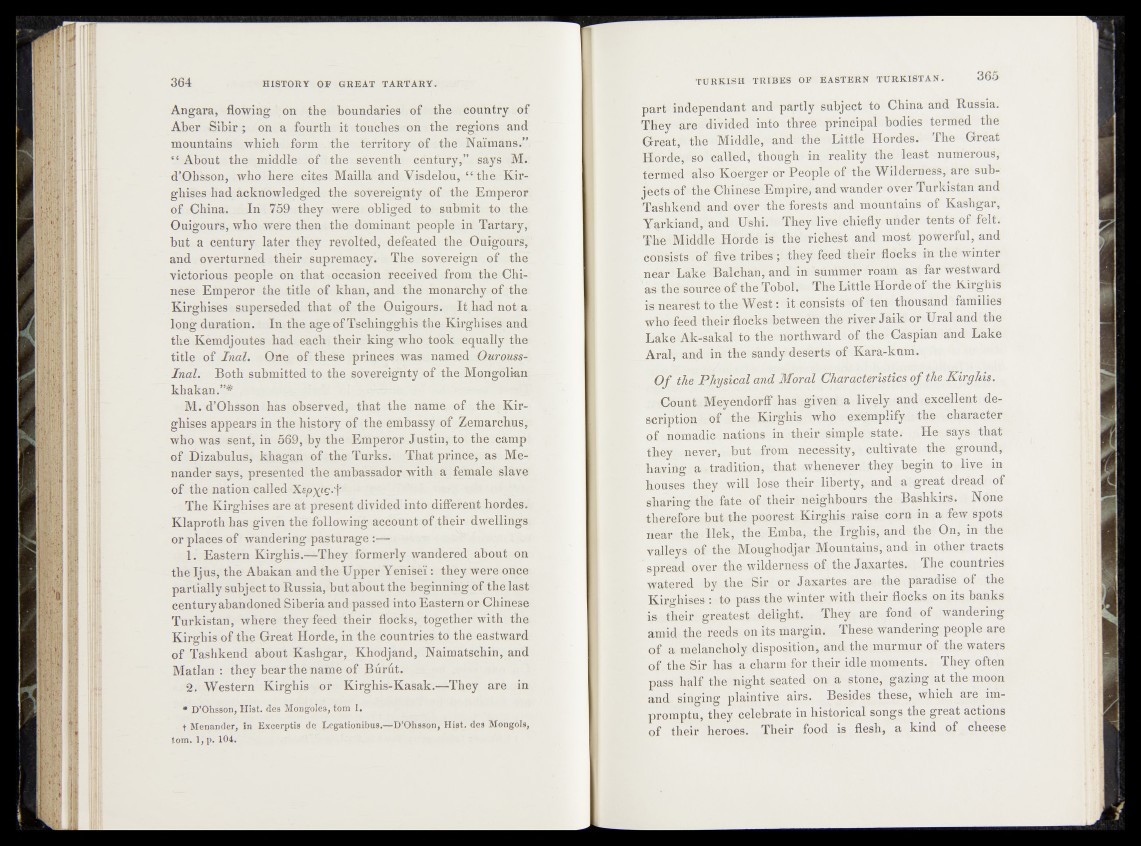
Angara, flowing on the- < boundaries' of the .f country of
Aber -Sibir; on a fourth it touchèsrron the®jons and
mountains .which form . thë^ferritory of ..the. Naimans.”
*.{ About.the middle, of i the ^seventh century,” . says M.
d’Ohsson, who tliéiife ci|es Mailla and Visdelaik, “ the Kirghises
had acknowledged the sovereignty of. the Emperor.
of China,__In 1759 they were >> obliged to submit to the
Ouigours, who were th en th e dominant people’«ms Tartary,
but a century later they revolted, defeated the Ouigours,
and overturned their supremacy.- The sovereign of the
victorious people on that - occasion received from ffelfe Chinese
Emperor the title of khan, and the monarchy ofothei
Kirghises superseded that of the Ouigours. It had not-a
long duration. In the age of Tschingghis the: Kirgh jses?and:
the Kemdjoutes had each; their king who took equally the
title of Inal. One of these princes wasi named* Ourouss-
InaL Both submitted to the sovereignty of rthhMojigolian
khakam”* \
M. d’Ohsson has observed, that the name of the Kirv-
ghises appears in the history of the embassy of Zemarchïusp
who was sent, in 569, by the Emperor Justin, to the.camp
of Dizabulus, khagan of the Turks. That prince, as Menander
says, presented- the ambassador with a female.1 >slave
of the nation called ‘Xep\ig.f
The Kirghises are at present divided into different hordes.
Klaproth has given the following aecountruf their dwellings
or places of wandering pasturage :■—
1 Eastern Kirghis.*—They formerly wandered about on
the Ijus, the Abakan and the Upper Yenisei': they were onpe
partially subject to Russia, but about the beginning óf the last
century abandoned Siberia and passed into Eastern or Chinese
Turkistan, where they feed their flocks, together with the
Kirghis of the Great Horde, in the countries to the eastward
of Tashkend about Kashgar, Khodjand, Naimatschin, and
Matlan : they bear the name of Bürüt.
2. Western Kirghis or Kirghis-Kasak.—They are in
* D’Ohsson, Hist, dés Mongoléè, tom 1.
. t Menander, in Excerptis de Legationibus.—D’Ohsson, Hist, des Mongols,
tom. 1 ,p . 104.
part in dependant and partly’’Subject to China and Russia.
They are divided. into othree principal bodies termed the
Gréât/- the Mlddl^-and the^Little Hordeid The Great
HiirdWsn' ealtéjÜV thoughv in -.reality the ^least numerous,
*tWméd^feo;Kc^êr or People1 of the Wilderness, are subjects
of the Ch iheWEmpira; and wander over.Turkistan and
Tashkend1 and over .the fUi^k^^tod mountains of Kashgar,
Yarkiand, andfUshk d They live' chiefly Under tents of felt.
The Middle Hotdeds thel?-richest and: most powerful, and
consists-rof. five tribes';? .they-feedMhedr flocks.-iln the winter
ne;â‘r J Lake- Balchan, and. in^summerIrbain as? far westward
as.thfeou!rfe|ifethe Tbboh The Little Hordfôof the Kirghis
is nearést to the WeSt-: ‘ it. consists, t-of -ten - thousand families
whyo'feédïtheir flocks ^between the- river faik. or. Ural and the
Lake Ak-sakal to the northward of the Caspian and Lake
Aral, and inrthe; sandydeserts of Kara-kftm.
Of the Physical and Moral Characteristics of the Kirghis.
CountJVteyendorff has given!,a lively, and excellent description!
of the Kirghis who . extemtplify the character
of nwmadie-nationsiffln.'their simple estate'. He says-that
- theyi- never,s:huts.if^t)m , necessity, ^ cultivate* the| | ground^
having a - tradition*- that whenever, they -begin to tiye .in
hou|ë^ they will lose their, liberty, and a great dread of
sharing the fate of their neighbours: the ,Bashkirs. | None
therefore.but the poorest Ki^ghisn raise corn in a few spots
near the-Uek, the -Emba, the Irghis, and the On, in the
valleys of the- Moughodjar Mountains,>and in other tracts
spread? over the wildernjess-.of the Jaxartes. The, countries
watered by# the .Sir. or Jaxartes are the paradise of . the
Kirghises : to papsthe winter with their flocks on its banks
is their greatest, delight. They are fond.- of .wandering
amid the?J?eeds on its margin. -These wandering people are
of a, melancholy disposition, and the murmur of the waters
of the Sir has a charm for their idle moments. They often
pass half the night seated on a stone, gazing at the moon
and singing plaintive airs. Besides these, which are impromptu,
they celebrate in historical songs the great actions
of their heroes. Their food is flesh, a kind of cheese